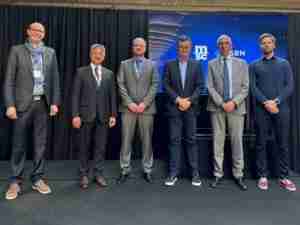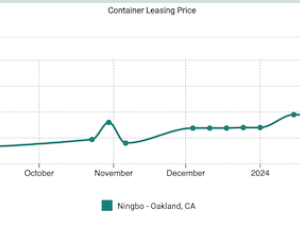By George Lauriat, Editor-in-Chief, AJOT
According to Rudy Mack, COO of American Feeder Lines (AFL), container ship feeder service will startup in the 2nd quarter of this year, linking Boston, Massachusetts; Portland, Maine and Halifax, Nova Scotia. In an interview in AJOT's Quincy, Massachusetts offices, Mack emphasized that AFL was in for the long haul.
And Mack, an industry veteran, knows something about the long haul. Mack was the former CEO and president of Hapag Lloyd Americas and spent thirty-five years with the German carrier. During his tenure the so-named 'Yankee Clipper' weekly container feeder ship service plied between Nova Scotia, Portland, Maine; Boston, Mass.; New York/New Jersey and on occasion, Portsmouth, New Hampshire. The Yankee Clippers' key ocean carrier supporter was Hapag Lloyd.
The service concept was fairly simple: Charter a small feeder box ship and shuttle boxes on behalf of the ocean carriers between the region's major ports. The advantage of a small feeder ship is it can maintain a schedule better than a barge, particularly during the Northeast winter months. Secondly, it takes boxes off the road, which can be a problem in the congested traffic corridors of the North East. Finally, for the ocean carriers, it allows balancing of boxes within a service schedule.
'The Yankee Clipper, gave us [Hapag Lloyd] a real service edge,' Mack recalled of the experience. The real key to long success of the Yankee Clipper service was reliability. 'You could set your clock by it,' Mack noted.
However, since the demise of the Yankee Clipper service, a variety of services have come and gone, much to the dismay of the region's shippers. With this legacy of failure still fresh, building a new service first and foremost required a commitment that would bring shippers back.
'What was needed was clear: a weekly, reliable service'a service with credibility. We (AFL) are not in for the short term ' this is the first step of a ten year plan,' Mack said. 'It's very important as this service (sets up) long term goals for feeder services on the East Coast,' added Mack.
Andrew Haines, who has been appointed Vice President of Line Management, said. 'We did a lot of research into the market, and shippers are very interested in an all-water service. There are shipments of paper and paper products that would be too expensive (because of weight concerns) to export.'
Haines continued, 'This is designed to be better (than the Yankee Clipper) as the schedule is tied closer to the [international] carrier rotation.' AFL has already found a ship agent (the same personnel that had handled similar feeder services in the past) in Boston and offices to handle the upcoming vessel rotation. AFL also said that they intend to call at both main terminals in the Port of Halifax to link the international carriers into the feeder service. In Boston, the feeder service will fill an important void in all-water services with the connection to Halifax and Portland.
Born in the USA
AFL's executives have said that Phase 1 will concentrate on developing the international trans-shipment business with a new emphasis on bringing in BCOs (beneficial cargo owners) as well as the ocean carriers. However, what has put a gleam in the eye of veterans like Mack is Phase 2 ' the introduction of 'Jones Act' services. The Jones Act, which allows a vessel to work between two US ports, requires the operator to build the ship in the US and to man the ship with a US crew. AFL says it has already been in discussions with Bay Shipbuilding in Wisconsin and Aker in Philadelphia about building the next generation of feeder boxs





